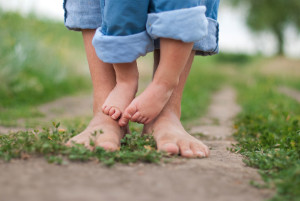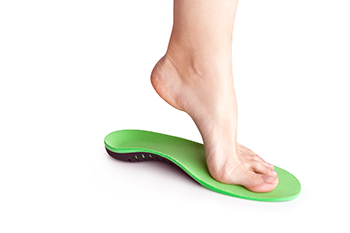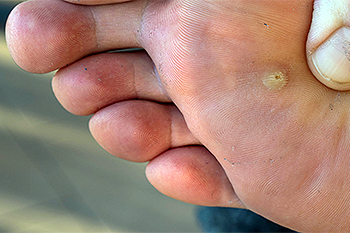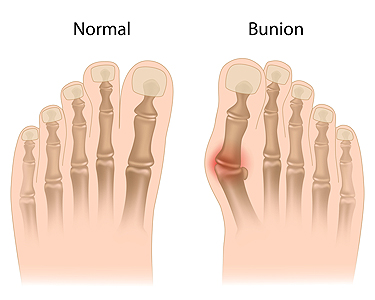
Dr. Kenneth Rosenthal
Dr. Jonathan C. O’Quinn
Dr. Michael J. Price

Dr. Kenneth Rosenthal
Dr. Jonathan C. O’Quinn
Dr. Michael J. Price

Vertical talus, often known as a rocker bottom foot, is a rare congenital condition in children where the talus bone, a key ankle component, points towards the ground instead of the toes. This misalignment leads to a stiff foot without an arch. It can occur alone or be associated with other health conditions. Diagnosis typically occurs at birth or through prenatal ultrasound. A podiatrist can assess flexibility and rigidity, using X-rays to determine the severity of misalignment. Oblique talus, a milder form of rocker bottom foot, shows misalignment only during weight-bearing. Treatment is aimed at reducing pain, advancing stability, and creating a functional foot. Non-surgical options, such as stretching or casting, may precede surgery. A series of casts can gradually improve foot flexibility. If surgery is needed, it corrects bone positions, potentially involving tendon or ligament lengthening. Post-surgery, casts, and pins are used to maintain corrections. Special shoes or braces may prevent recurrence. Understanding rocker bottom foot deformities is important for early detection and effective treatment. With a combination of non-surgical and surgical approaches, podiatrists aim to ensure pain-free, stable, and functional feet for optimal childhood development. Regular follow-up visits can help to monitor growth and address issues promptly. It is suggested that you make an appointment with a podiatrist to discuss the treatment schedule for your child.
Congenital foot problems require immediate attention to avoid future complications. If you have any concerns, contact one of our podiatrists of Eastern Carolina Foot & Ankle Specialists. Our doctors can provide the care you need to keep you pain-free and on your feet.
Congenital foot problems are deformities affecting the feet, toes, and/or ankles that children are born with. Some of these conditions have a genetic cause while others just happen. Some specific foot ailments that children may be born with include clubfeet, polydactyly/macrodactyly, and cleft foot. There are several other foot anomalies that can occur congenitally. What all of these conditions have in common is that a child may experience difficulty walking or performing everyday activities, as well as trouble finding footwear that fits their foot deformity. Some of these conditions are more serious than others. Consulting with a podiatrist as early as possible will help in properly diagnosing a child’s foot condition while getting the necessary treatment underway.
What are Causes of Congenital Foot Problem?
A congenital foot problem is one that happens to a child at birth. These conditions can be caused by a genetic predisposition, developmental or positional abnormalities during gestation, or with no known cause.
What are Symptoms of Congenital Foot Problems?
Symptoms vary by the congenital condition. Symptoms may consist of the following:
Treatment and Prevention
While there is nothing one can do to prevent congenital foot problems, raising awareness and receiving neonatal screenings are important. Early detection by taking your child to a podiatrist leads to the best outcome possible.
If you have any questions please feel free to contact our office located in Greenville, NC . We offer the newest diagnostic tools and technology to treat your foot and ankle needs.

Managing plantar fasciitis can make mornings difficult, as stepping out of bed often brings heel pain. This common condition causes discomfort in the heel or foot arch, hindering activities such as exercising and walking. Plantar fasciitis stems from various causes, including excessive exercise, repetitive motion, or from wearing ill-fitting footwear Additionally, conditions that can include high arches, flat feet, weight gain, diabetes, and arthritis may also lead to developing this condition. These factors can lead to inflammation in the plantar fascia. Custom-made orthotics, tailored to your foot's biomechanics and gait, can be an effective treatment. These devices, fitted in your shoes, can aid in recovery from stress or tears and mitigate movements causing inflammation. If you suffer from persistent plantar fasciitis pain, it is suggested that you make an appointment with a podiatrist who can design orthotics for you to help manage your heel pain.
If you are having discomfort in your feet and would like to try orthotics, contact one of our podiatrists from Eastern Carolina Foot & Ankle Specialists. Our doctors can provide the care you need to keep you pain-free and on your feet.
What Are Orthotics?
Orthotics are inserts you can place into your shoes to help with a variety of foot problems such as flat feet or foot pain. Orthotics provide relief and comfort for minor foot and heel pain but can’t correct serious biomechanical problems in your feet.
Over-the-Counter Inserts
Orthotics come in a wide variety of over-the-counter inserts that are used to treat foot pain, heel pain, and minor problems. For example, arch supports can be inserted into your shoes to help correct overarched or flat feet, while gel insoles are often used because they provide comfort and relief from foot and heel pain by alleviating pressure.
Prescription Orthotics
If over-the-counter inserts don’t work for you or if you have a more severe foot concern, it is possible to have your podiatrist prescribe custom orthotics. These high-quality inserts are designed to treat problems such as abnormal motion, plantar fasciitis, and severe forms of heel pain. They can even be used to help patients suffering from diabetes by treating foot ulcers and painful calluses and are usually molded to your feet individually, which allows them to provide full support and comfort.
If you are experiencing minor to severe foot or heel pain, it’s recommended to speak with your podiatrist about the possibilities of using orthotics. A podiatrist can determine which type of orthotic is right for you and allow you to take the first steps towards being pain-free.
If you have any questions please contact our office located in Greenville, NC . We offer the newest diagnostic and treatment technologies for all your foot and ankle needs.

Plantar warts, small growths caused by the human papillomavirus, or HPV, often appear on the soles of the feet. Unlike common warts, which typically grow on the hands, plantar warts can be painful due to the pressure exerted on the soles when walking or standing. These warts may have a rough, grainy appearance with tiny black dots, which are actually clotted blood vessels. Several risk factors increase the likelihood of developing plantar warts. Close contact with the virus, such as walking barefoot in damp and communal areas like locker rooms, swimming pools, or public showers, can put your feet at risk. Additionally, those with a weakened immune system, such as individuals with diabetes or HIV, are more susceptible to plantar warts. Constantly moist or sweaty feet can provide an ideal environment for the virus to thrive. If you have developed a plantar wart, it is strongly suggested that you consult a podiatrist who can provide relief with appropriate treatment methods.
Plantar warts can be very uncomfortable. If you need your feet checked, contact one of our podiatrists from Eastern Carolina Foot & Ankle Specialists. Our doctors will assist you with all of your foot and ankle needs.
About Plantar Warts
Plantar warts are the result of HPV, or human papillomavirus, getting into open wounds on the feet. They are mostly found on the heels or balls of the feet.
While plantar warts are generally harmless, those experiencing excessive pain or those suffering from diabetes or a compromised immune system require immediate medical care. Plantar warts are easily diagnosed, usually through scraping off a bit of rough skin or by getting a biopsy.
Symptoms
Treatment
To help prevent developing plantar warts, avoid walking barefoot over abrasive surfaces that can cause cuts or wounds for HPV to get into. Avoiding direct contact with other warts, as well as not picking or rubbing existing warts, can help prevent the further spread of plantar warts. However, if you think you have developed plantar warts, speak to your podiatrist. He or she can diagnose the warts on your feet and recommend the appropriate treatment options.
If you have any questions please feel free to contact our office located in Greenville, NC . We offer the newest diagnostic and treatment technologies for all your foot and ankle needs.

Bunions, those bony protrusions that form at the base of the big toe, can be both painful and unsightly. Recognizing the symptoms of bunions is essential to address this common foot condition effectively. One of the most apparent signs is the visible bump on the side of the big toe, which may be accompanied by redness and swelling. Bunions often cause pain, which can range from mild to severe, especially when wearing tight shoes or engaging in activities that put pressure on the affected area. Over time, the big toe may start to deviate towards the other toes, causing further discomfort and potentially leading to complications like hammertoes. Apart from the physical symptoms, bunions can impact daily life by limiting choice of footwear and causing difficulty in finding comfortable, supportive shoes. Early intervention can help alleviate pain and prevent the condition from worsening, making it vital to recognize the signs and seek professional advice from a podiatrist to address bunions and regain foot comfort and functionality. If you see symptoms of a bunion developing, it is suggested that you schedule an appointment with a podiatrist who can offer you various forms of relief and effective treatment methods.
If you are suffering from bunion pain, contact one of our podiatrists of Eastern Carolina Foot & Ankle Specialists. Our doctors can provide the care you need to keep you pain-free and on your feet.
What Is a Bunion?
Bunions are painful bony bumps that usually develop on the inside of the foot at the joint of the big toe. As the deformity increases over time, it may become painful to walk and wear shoes. Women are more likely to exacerbate existing bunions since they often wear tight, narrow shoes that shift their toes together. Bunion pain can be relieved by wearing wider shoes with enough room for the toes.
Causes
Symptoms
In order to diagnose your bunion, your podiatrist may ask about your medical history, symptoms, and general health. Your doctor might also order an x-ray to take a closer look at your feet. Nonsurgical treatment options include orthotics, padding, icing, changes in footwear, and medication. If nonsurgical treatments don’t alleviate your bunion pain, surgery may be necessary.
If you have any questions, please feel free to contact our office located in Greenville, NC . We offer the newest diagnostic and treatment technologies for all your foot care needs.